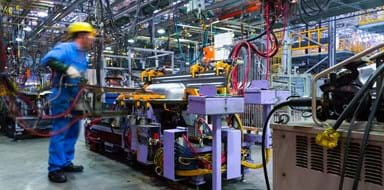
A manufacturer of sports safety equipment has doubled productivity, reduced waste, and upskilled its workforce after investing in automation, with the support of Made Smarter.
Foams 4 Sports, based in Ashton-under-Lyne, Greater Manchester, has been supplying high-quality sports equipment to the NHS, martial arts clubs, prisons, school halls, and outdoor sports venues for 20 years.
Recognising the need to increase capacity for growth it has replaced manual cutting with a digital CNC, transforming its capacity and opportunities for growth.
Ben Michael, General Manager, said: “We have a fantastic team and a great reputation in the market. But now it is time to ramp things up and technology is the answer.
“Made Smarter has been incredible for us, supporting us to create a roadmap, exploring technology solutions and helping us understand the impact of change on our workforce. The future is exciting for Foams 4 Sports.”
Case Study - Foams 4 Sports“Digital transformation is vital for the next stage of our business growth. We need to look to technology as a solution to our challenges. This is a massive leap forward.”
Ben Michael, General Manager, Foams 4 Sports
Foams 4 Sports is a £5m turnover business operating a factory employing 32 people.
In order to achieve its growth targets, it needed to remove the bottleneck in its manual cutting process which was limiting capacity.
Ben explained: “For a long time the business relied upon the skills and experience of a veteran cutter, but the rate of growth we are experiencing means that the manual process of cutting covers into shape from various fabrics was no longer sustainable. It was time consuming, inefficient and inconsistent.”
The company engaged with Made Smarter and went through the Digital Transformation Workshop process. This analysis of people, product and process created a digital roadmap with opportunities to upgrade its operating systems to handle its complex trading divisions, move to an ERP system, and automate some of its manual manufacturing processes, as well as upskilling its workforce.
The business identified automating its cutting process as a priority and, using a £20,000 grant from Made Smarter, invested in a Zünd G3 XL-3200 machine.
The CNC cutter enabled the business to digitise the templating process by integrating with CAD software. This has enabled nesting which uses algorithms to optimise the layout of the required cuts to reduce waste.
Zund also provided training to the cutting team so they could transition from the manual to a digital process, ramping up production gradually.
The new technology has transformed the cutting process in terms of efficiency, waste and productivity.
The digital cutting operation can now cut the same volume of product in less than half of the time with increased consistency.
This has created extra capacity to boost stock levels and reduced lead times. It has also freed up time to focus on its B2C offering and bespoke requests.
While the process is still ramping up to capacity, the investment is forecast to reduce waste by 50%, increase productivity by 100% and increase turnover by 10% in its first year or operation.
One of the biggest impacts of the investment has been on the workforce, particularly on cutting supervisor Duncan Garlick, a veteran operator whose role has transformed.
Ben said: “Duncan is one of this company’s greatest assets. His knowledge, skill and experience has helped us grow organically. It has been fantastic to offer him the opportunity to learn new skills and take charge of the digital cutting operation.
“By his own admission he rarely uses technology, so this change was out of his comfort zone. But he has embraced the machinery and its benefits. It has freed him up to lend his expertise to R&D and problem solving. Having someone in his 60s appreciate what we’re trying to achieve here has really boosted morale and will help our digital transformation.”
As well as upskilling roles in the business, Foams 4 Sports expects to create three manufacturing jobs over the next year to tackle the increase in production.
The success of the project has accelerated the business along its digital adoption journey.
The aim now is to get a grip of its data and begin to make improvements across all operations.
Ben added: “Digital transformation is vital for the next stage of our business growth. We need to look to technology as a solution to our challenges. This is a massive leap forward.”








